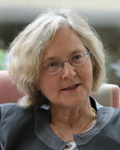NAR-Colloquium: Prof. Elizabeth H. Blackburn, PhD
July 17, 2008, 6:00 pm, Print Media Academy, Heidelberg

Elizabeth H. Blackburn, PhD
Morris Herzstein Endowed Professor in Biology & Physiology Department of Biochemistry & Biophysics University of California, San Francisco
Telomerase and the Causes of Aging (Videolecture 60min.)
Every one of the many trillions of cells in our bodies that has genetic information carries it in the form of 46 chromosomes. Every chromosome contains a long linear DNA molecule, with ends that must be protected. Telomeres are the structures that protect and stabilize the ends of chromosomes, ensuring genomic stability. Telomeres consist of simple DNA sequences, which bind cellular protein factors and make a "cap", thus securing each end of every chromosome. Without telomeric DNA and its special way of replicating, chromosome ends dwindle away as their telomeric DNA erodes, eventually causing cells stop dividing altogether. For humans to live a long life, this dwindling down has to be counteracted.
Cells have an enzyme called telomerase that replenishes telomeres, and protects them. Can the understanding of telomeres and telomerase be exploited to improve health and combat cancer? New results suggest this is possible.
Telomerase is present in a great many normal cells in human adults, although often in only low amounts. Throughout human life a minimal level of telomerase is required for replenishment of tissues, such as the immune system. Telomerase activity partly counteracts the dwindling down of telomeres throughout the human life span. This can be altered by non-genetic factors. Indeed, our recent collaborative studies showed that the amount of telomerase activity in certain white blood cells of the body is diminished by chronic psychological stress: in caregivers of a chronically ill family member, the more years the caregiving situation has lasted, and the worse the perceived stress, the lower the amount of telomerase activity in blood cells, and the shorter their telomeres. Furthermore, low telomerase was associated with six of the known major risk factors - including chronic psychological stress - for cardiovascular disease in people.
Telomerase has another face - in the setting of a cancer cell, which is very different from a normal cell, it promotes cancer. As most human cancers progress, their telomerase becomes hyperactive. We have begun ways of exploiting this abnormally high telomerase activity to kill cancer cells, by re-directing telomerase specifically in cancer cells to make "toxic telomeres". The challenge now is to develop the emerging molecular and cellular information about telomerase into rational cancer therapies.
Personal Data
Prof. Blackburn is a leader in the area of telomere and telomerase research. She discovered the molecular nature of telomeres-the ends of eukaryotic chromosomes that serve as protective caps essential for preserving the genetic information - and she discovered the ribonucleoprotein enzyme, telomerase. Blackburn and her research team at the University of California, San Francisco are working with various cells including human cells, with the goal of understanding telomerase and telomere biology.
Blackburn earned her B.Sc. [1970] and M.Sc. [1972] degrees from the University of Melbourne in Australia, and her Ph.D. [1975] from the University of Cambridge in England. She did her postdoctoral work in Molecular and Cellular Biology from 1975 to 1977 at Yale.
In 1978, Blackburn joined the faculty at the University of California at Berkeley in the Department of Molecular Biology. In 1990, she joined the Department of Microbiology and Immunology at UC San Francisco, where she served as Department Chair from 1993 to 1999. Blackburn is currently a faculty member in Department of Biochemistry and Biophysics at UCSF. She is also a Non-Resident Fellow of the Salk Institute.
Throughout her career, Blackburn has been honored by her peers as the recipient of many prestigious awards. These include the Eli Lilly Research Award for Microbiology and Immunology [1988], the National Academy of Science Award in Molecular Biology [1990], and an Honorary Doctorate of Science from Yale University [1991]. She was a Harvey Society Lecturer at the Harvey Society in New York [1990], and the recipient of the UCSF Women's Faculty Association Award [1995]. Most recently, she was awarded the Australia Prize [1998], named California Scientist of the Year in 1999, and awarded the Harvey Prize [1999], the Keio Prize [1999], American Association for Cancer Research-G.H.A. Clowes Memorial Award [2000], American Cancer Society Medal of Honor [2000], AACR-Pezcoller Foundation International Award for Cancer Research [2001], General Motors Cancer Research Foundation Alfred P. Sloan Award [2001], E.B.Wilson Award of the American Society for Cell Biology [2001], 26th Annual Bristol-Myers Squibb Award for Distinguished Achievement in Cancer Research [2003], the Dr. A.H. Heineken Prize for Medicine [2004], The Kirk A. Landon-AACR prize for Basic cancer Research [2005] and The Albert Lasker Medical Research Award in Basic Medical Research [2006]. She was elected President of the American Society for Cell Biology for the year 1998. Blackburn is an elected Fellow of the American Academy of Arts and Sciences [1991], the Royal Society of London [1992], the American Academy of Microbiology [1993], and the American Association for the Advancement of Science [2000]. She was elected Foreign Associate of the National Academy of Sciences in 1993, and was elected as a Member of the Institute of Medicine in 2000. In 2007 she was named as one of Time Magazine's Most 100 Influential People.


